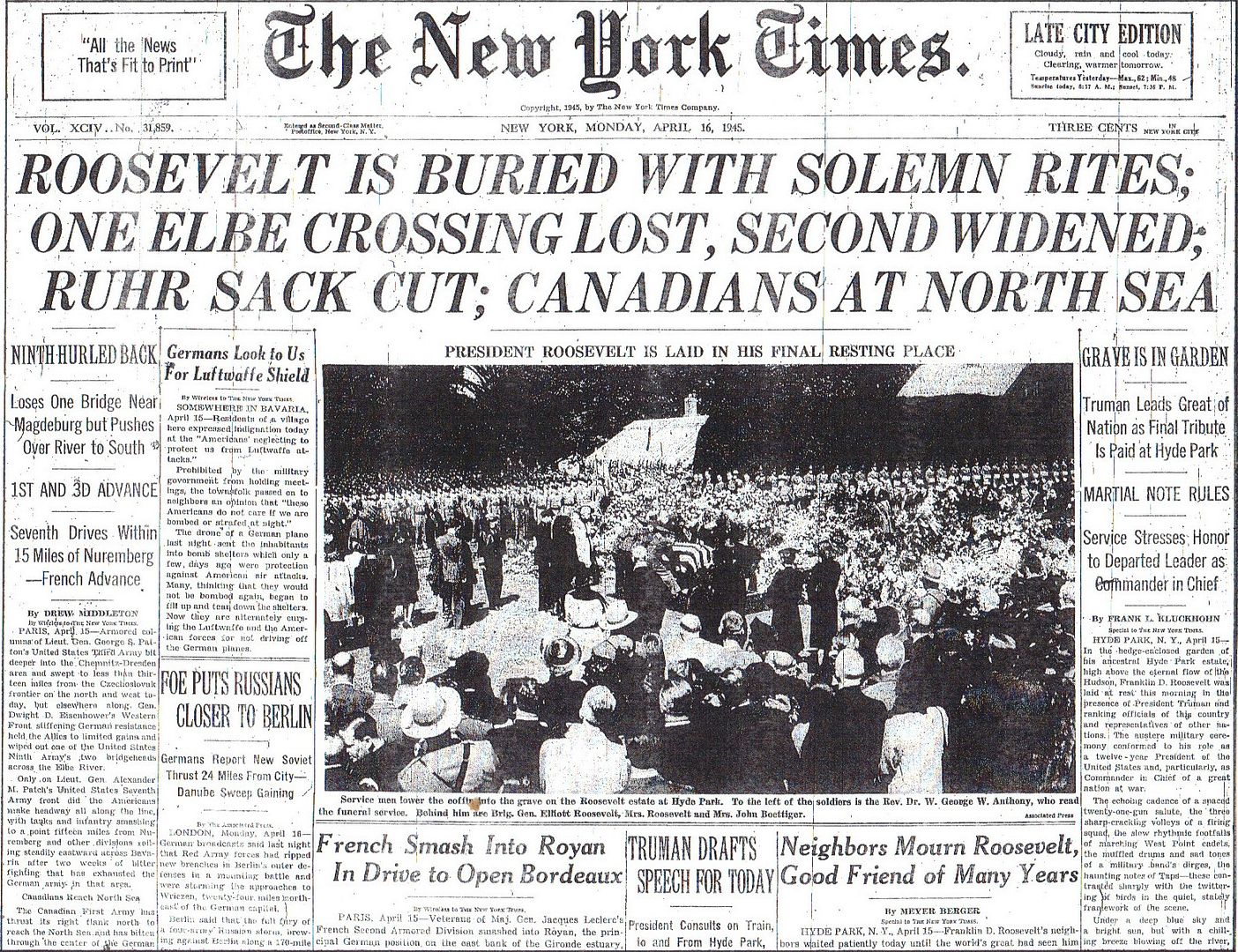
Posted on 04/16/2015 4:43:40 AM PDT by Homer_J_Simpson

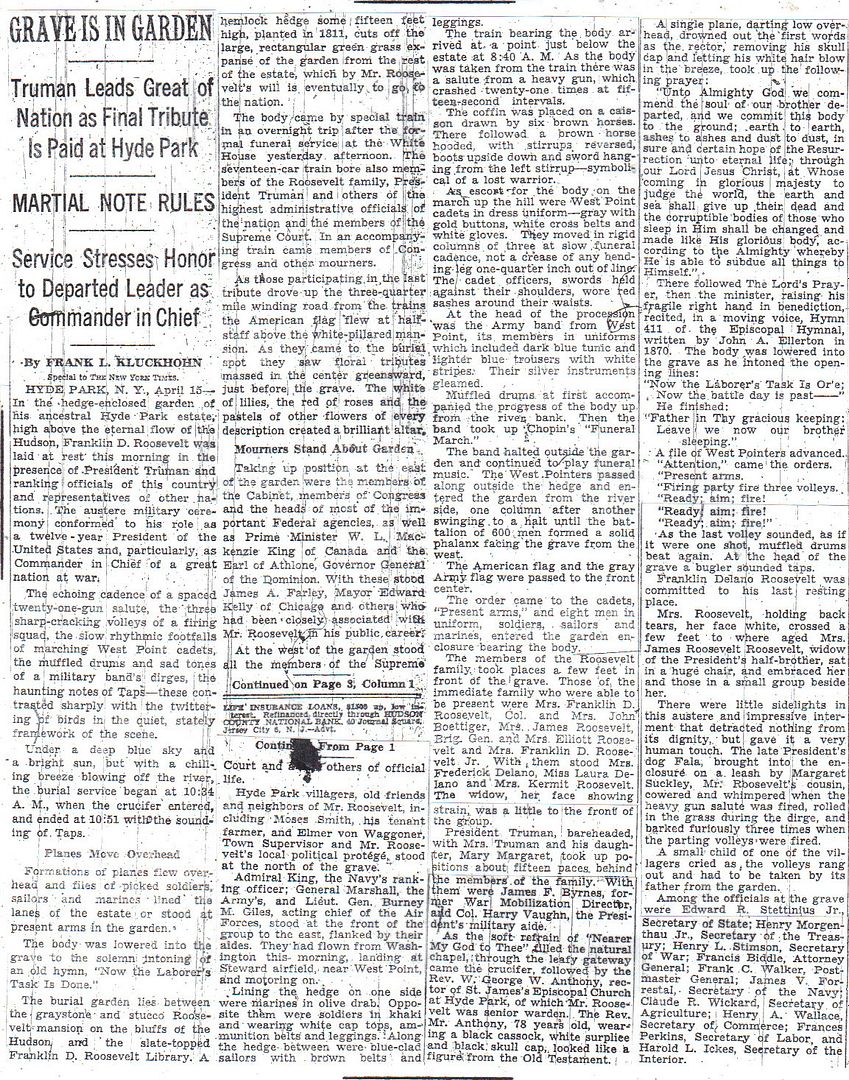
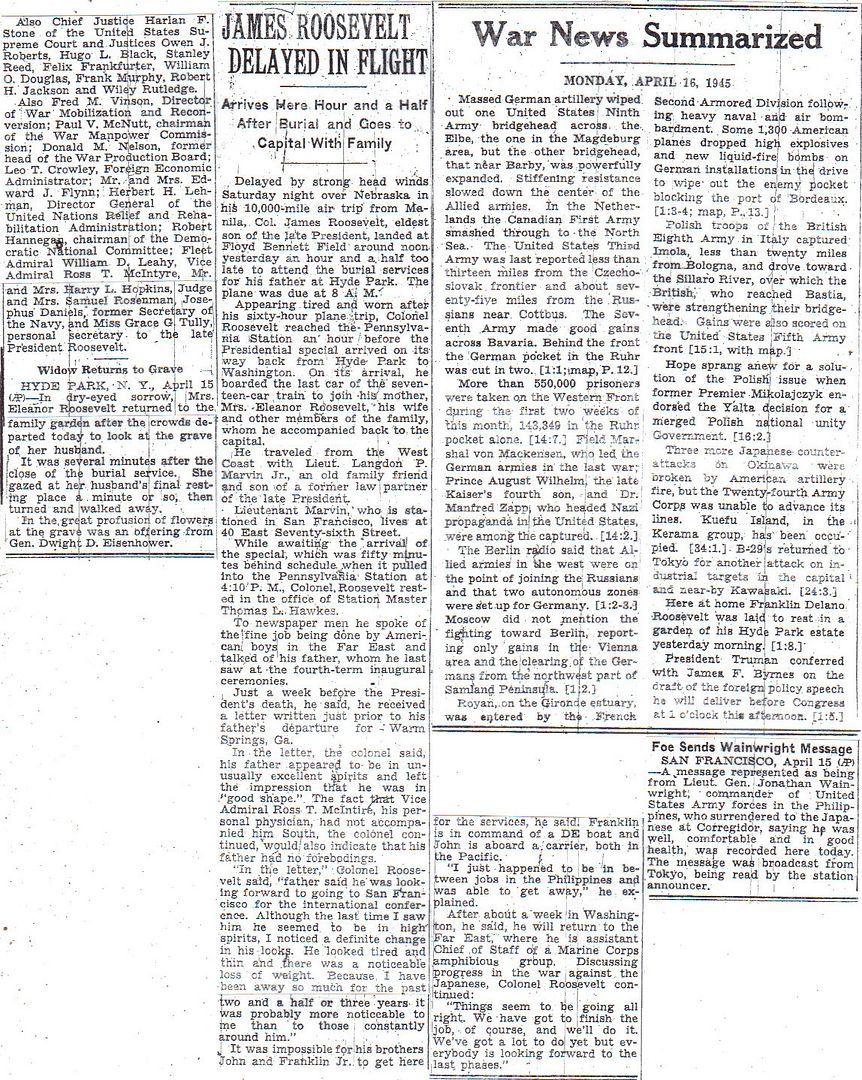
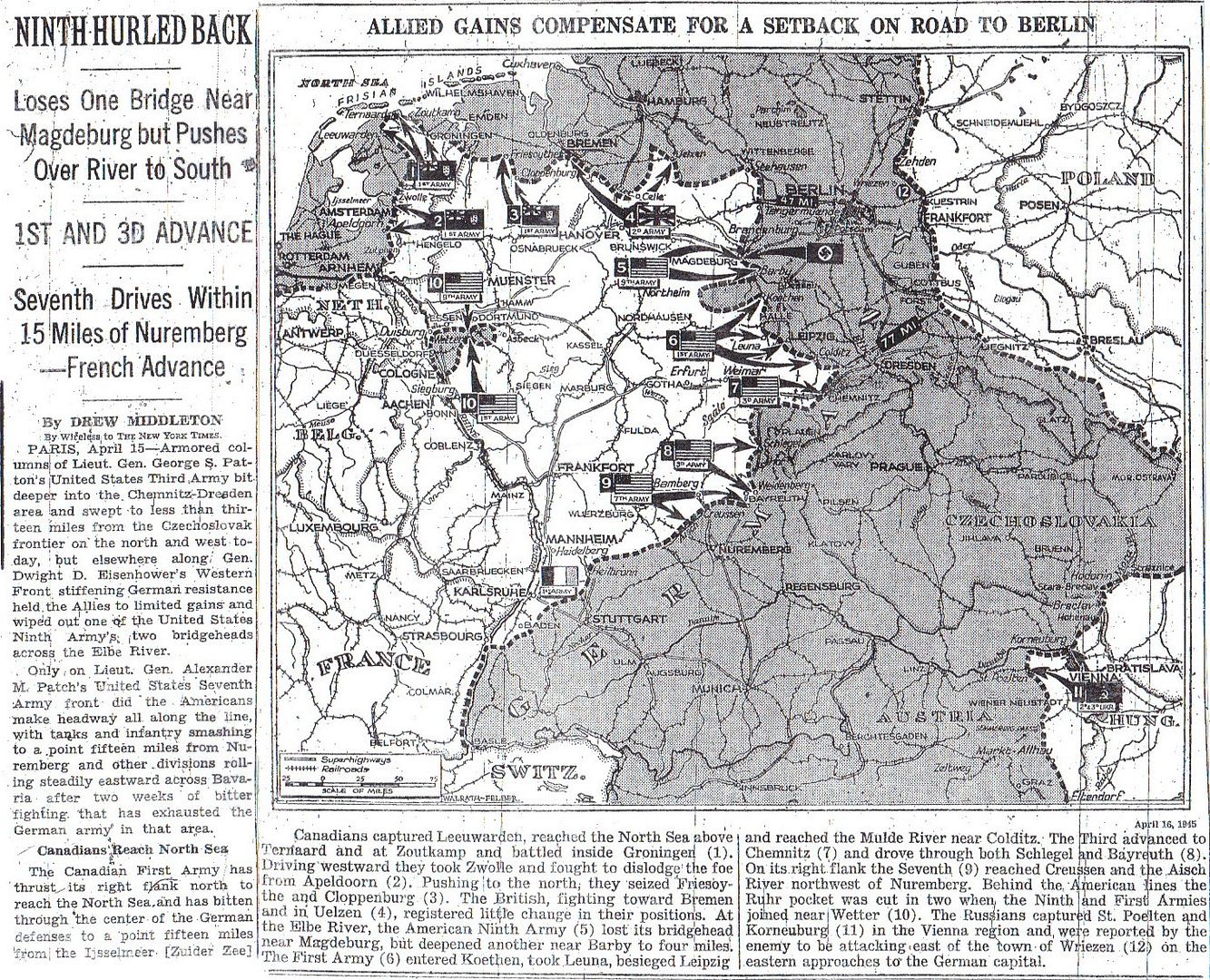
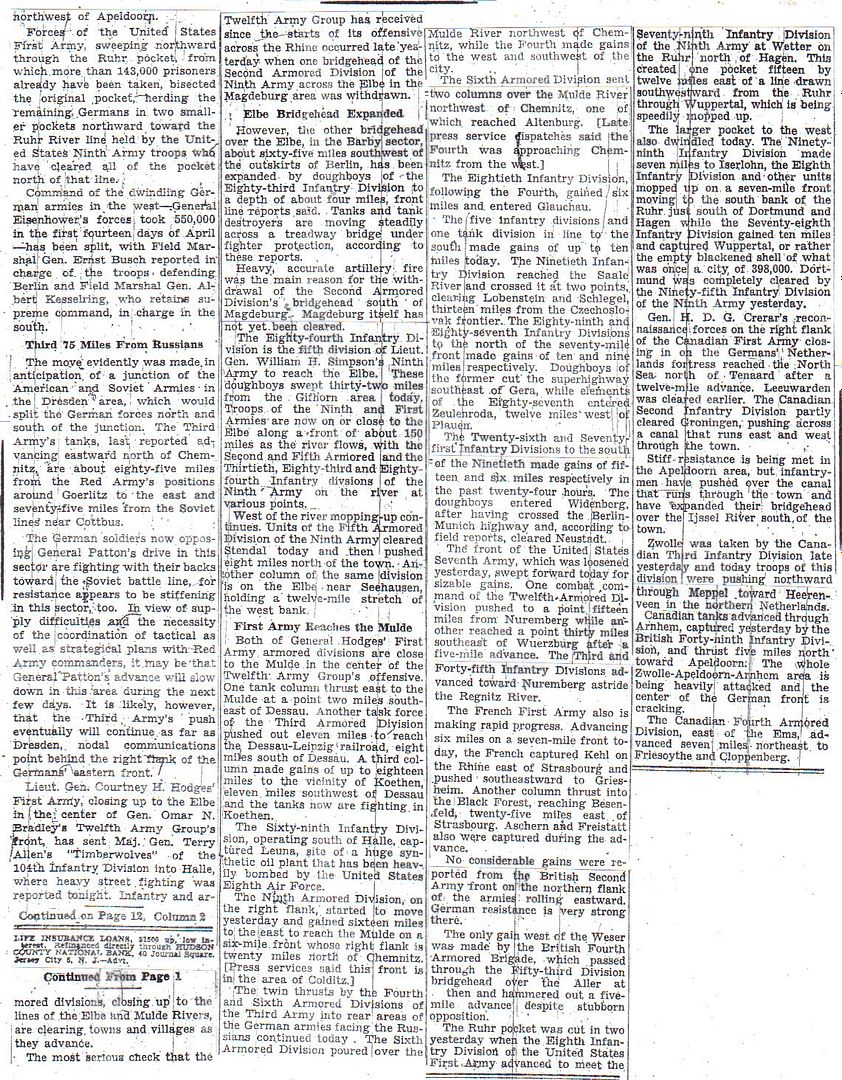
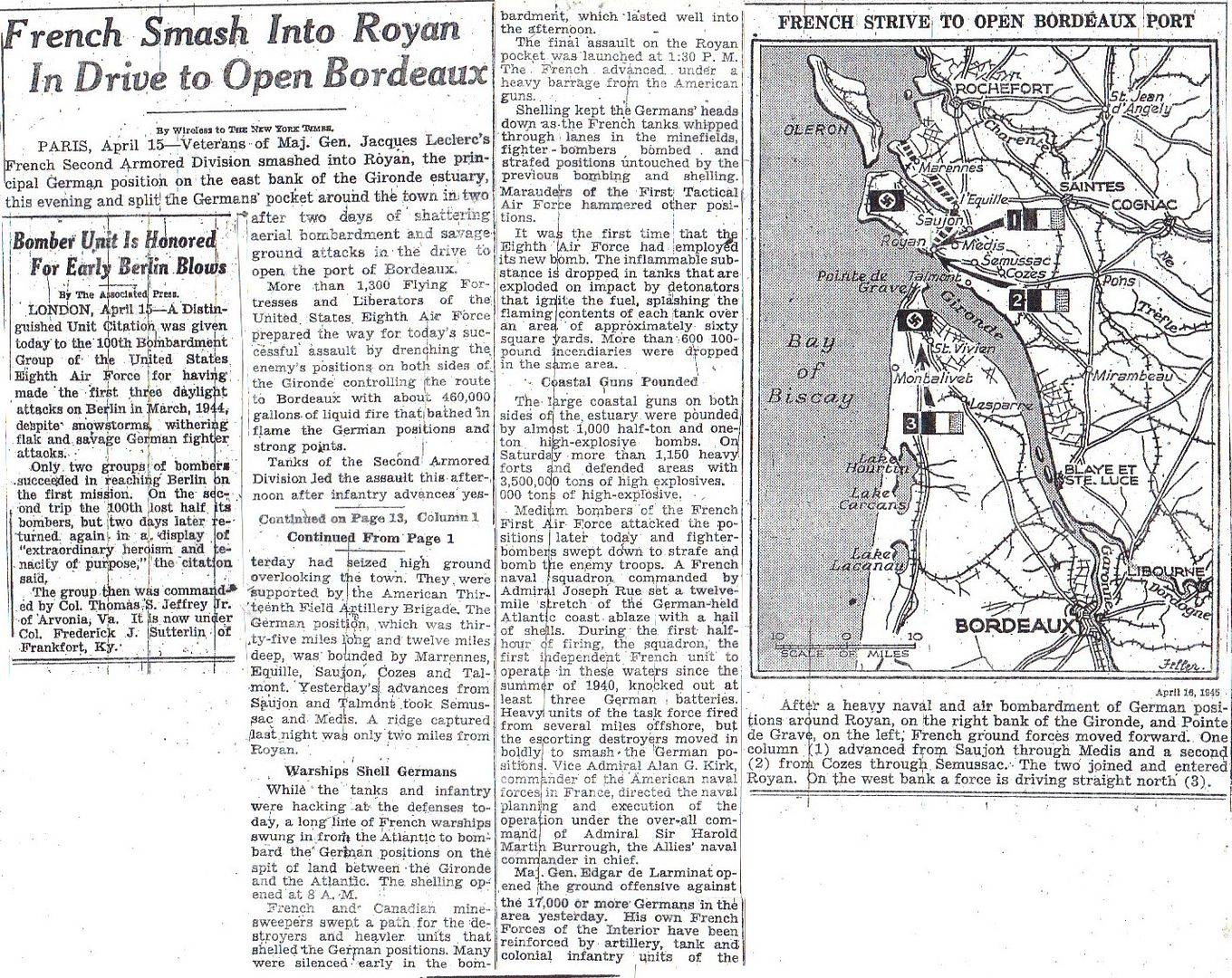
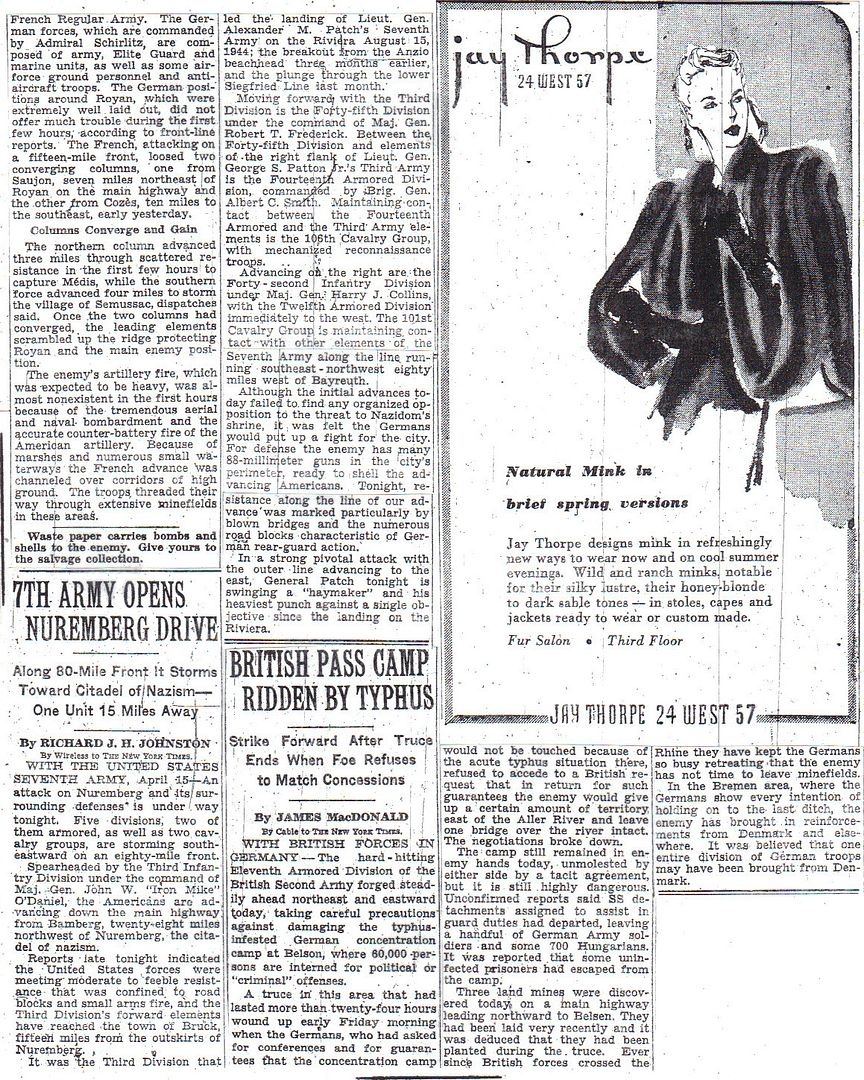
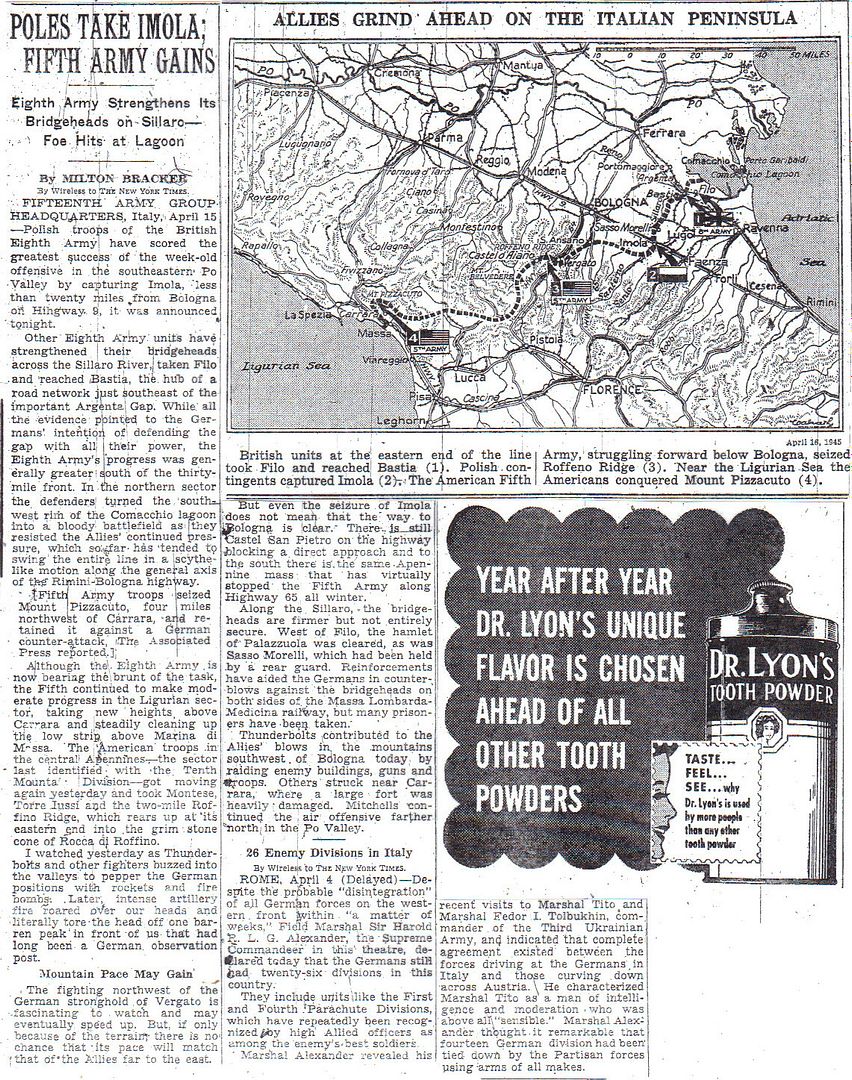
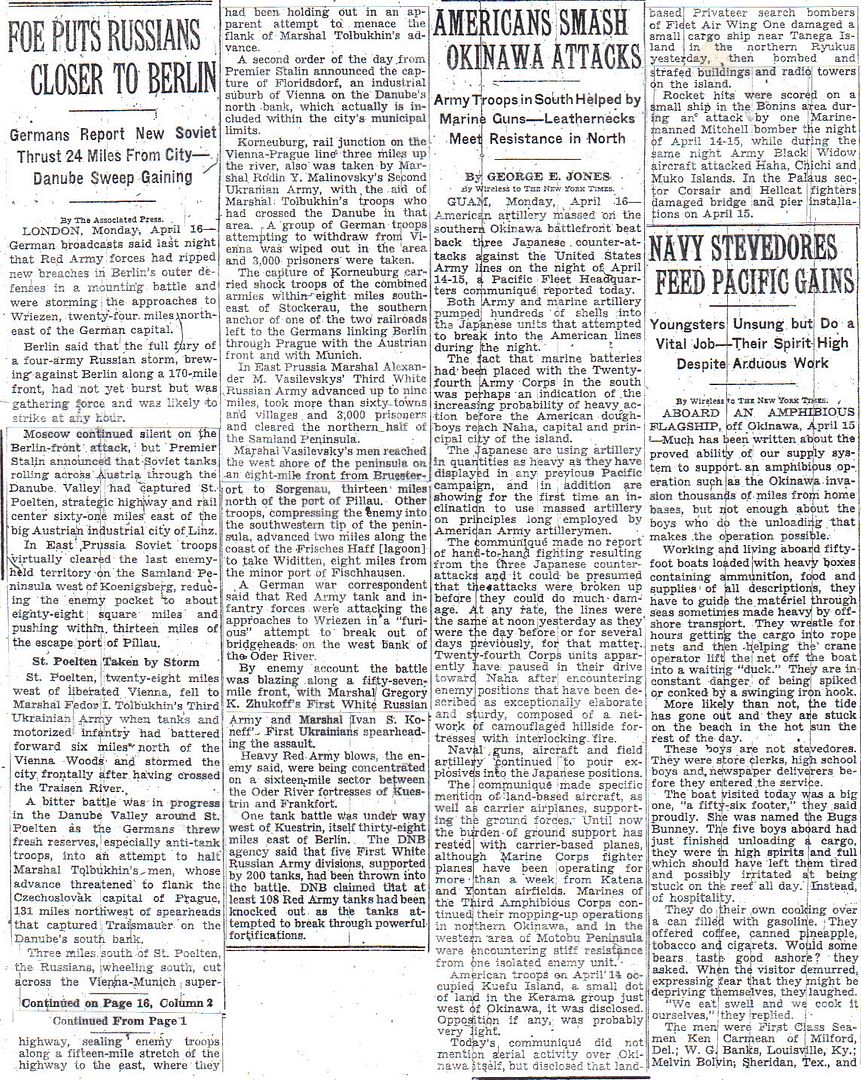
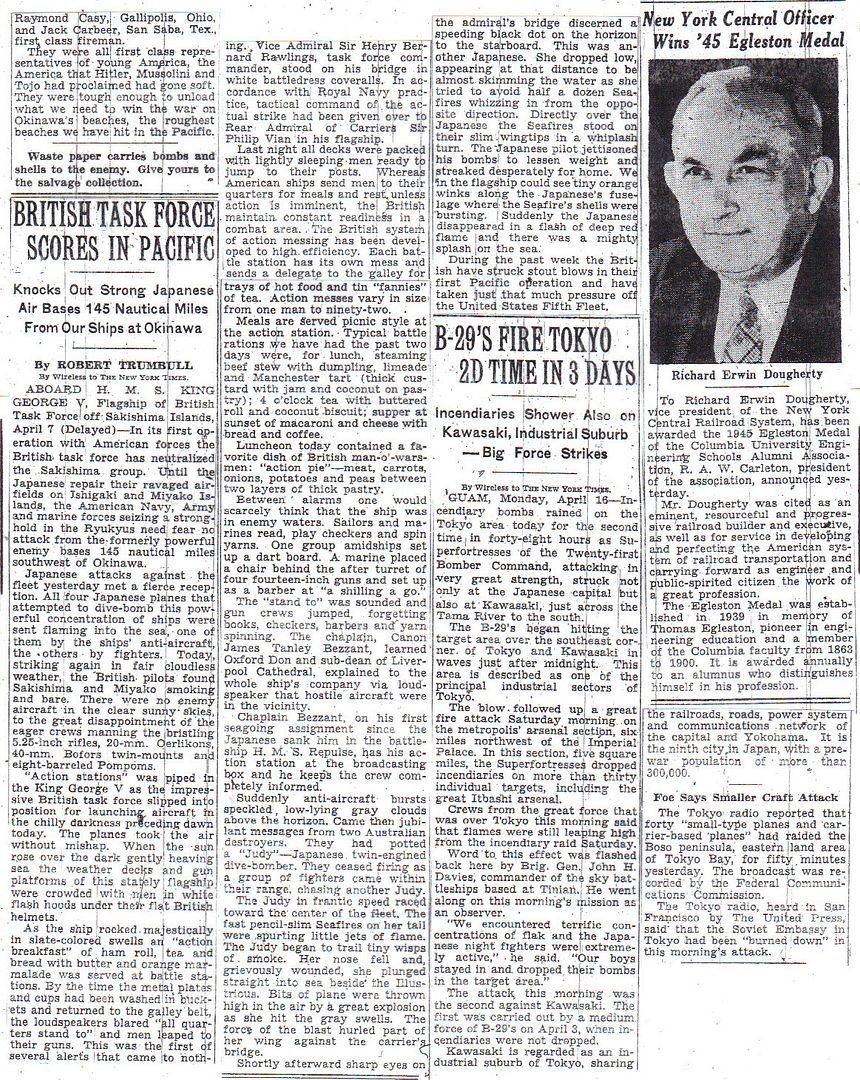
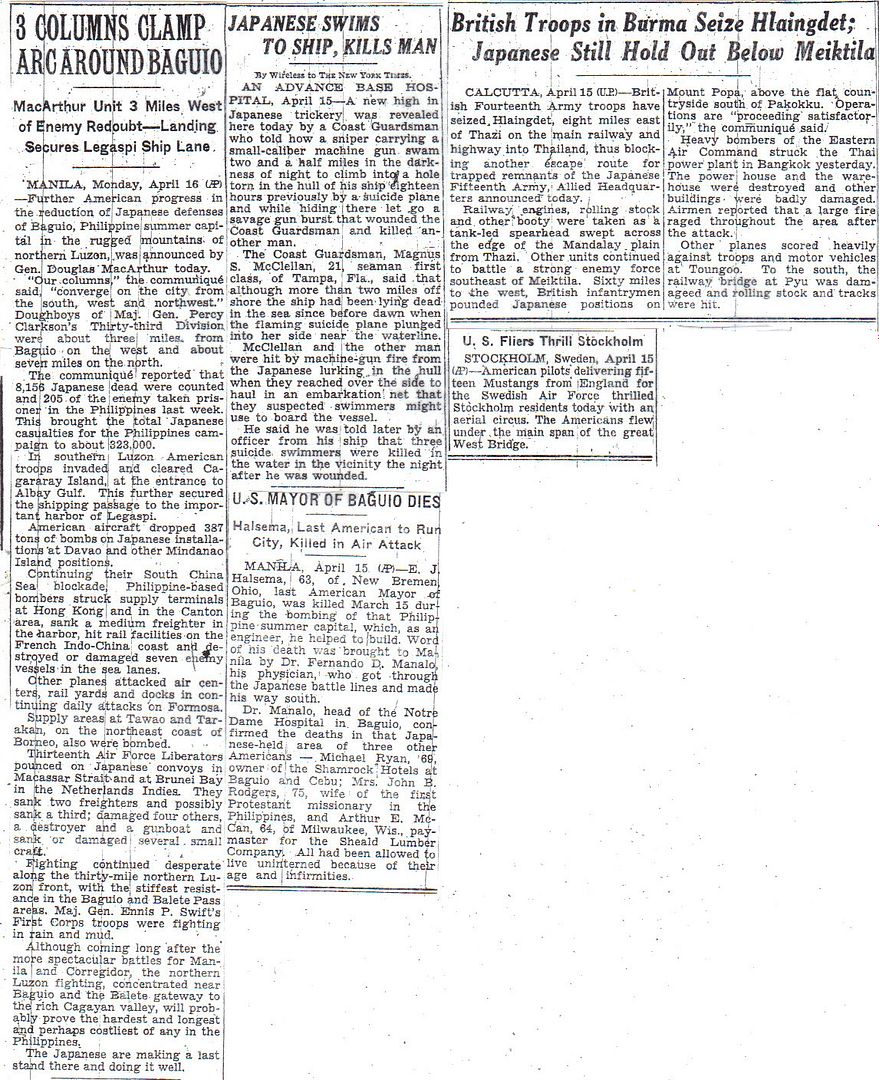
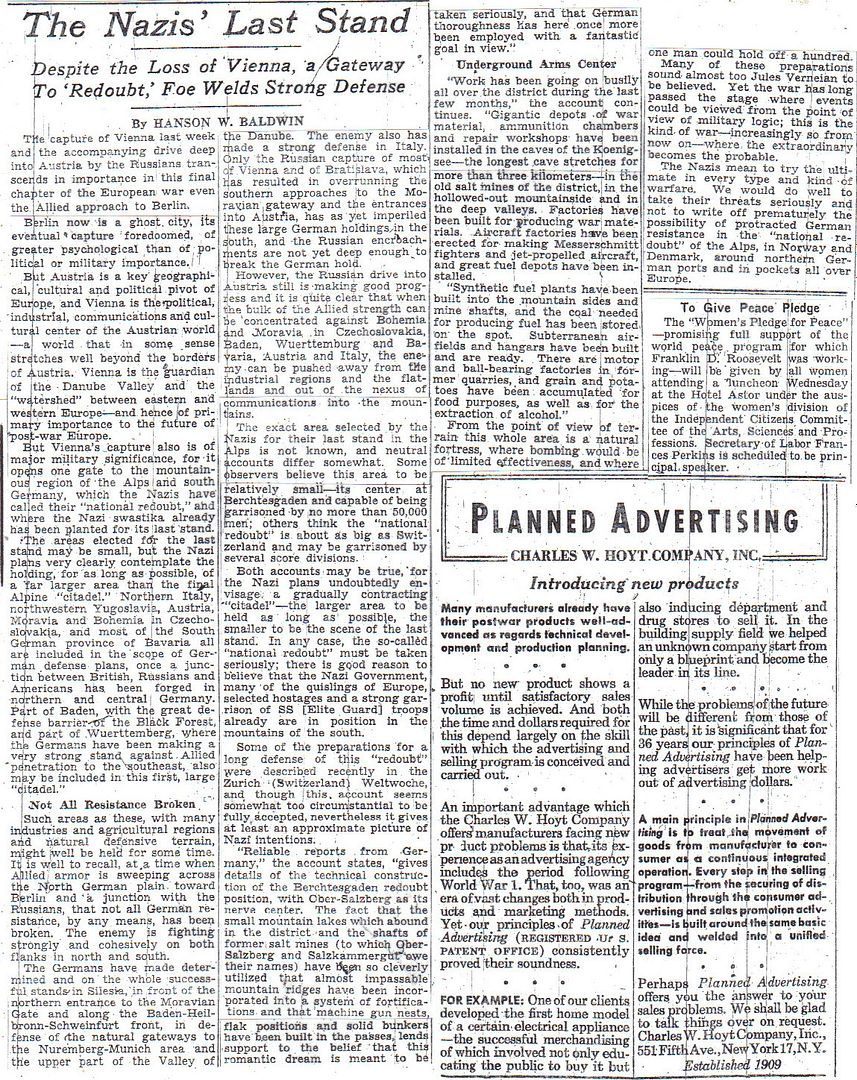
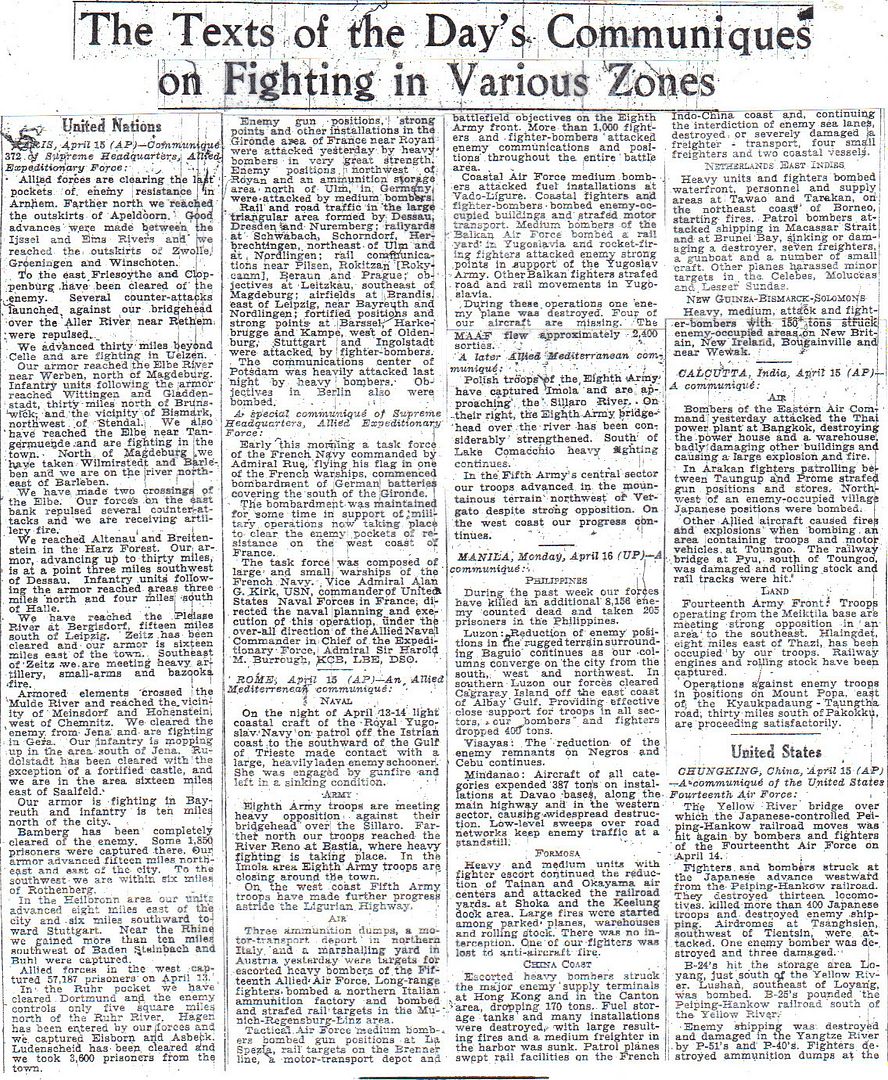
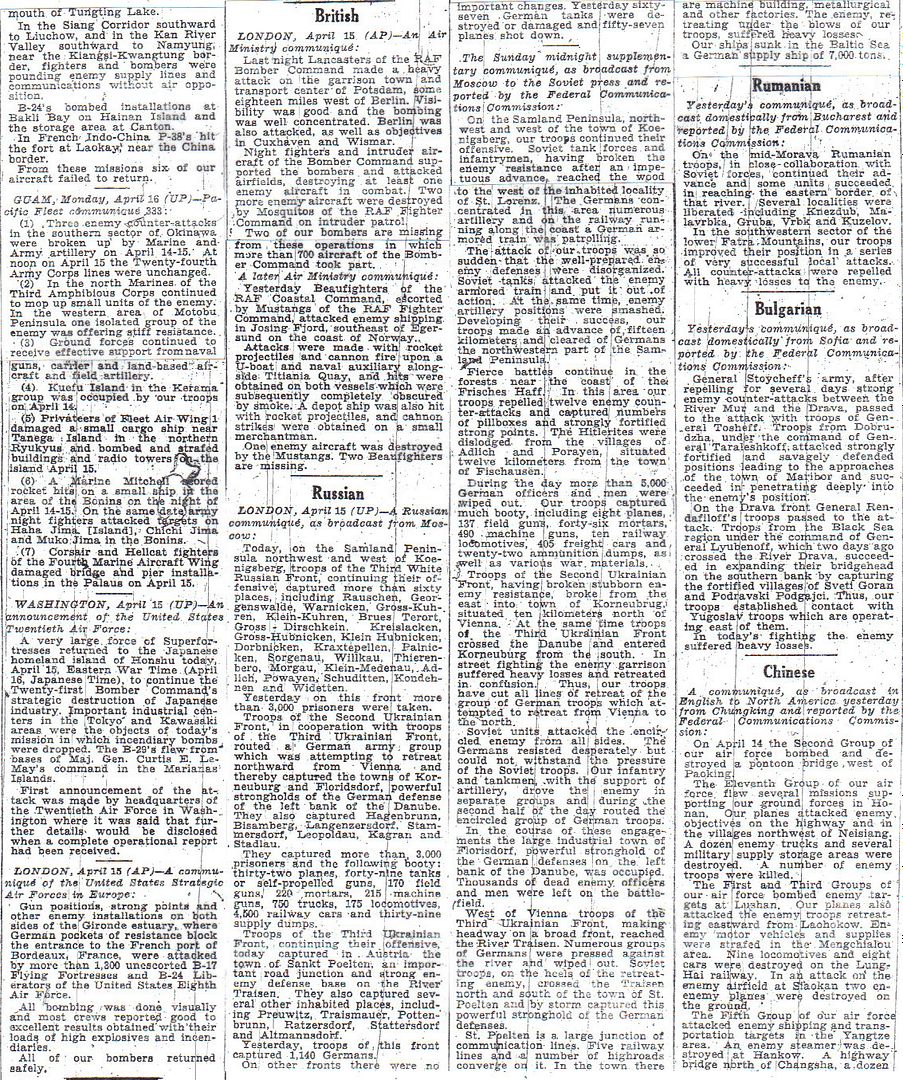
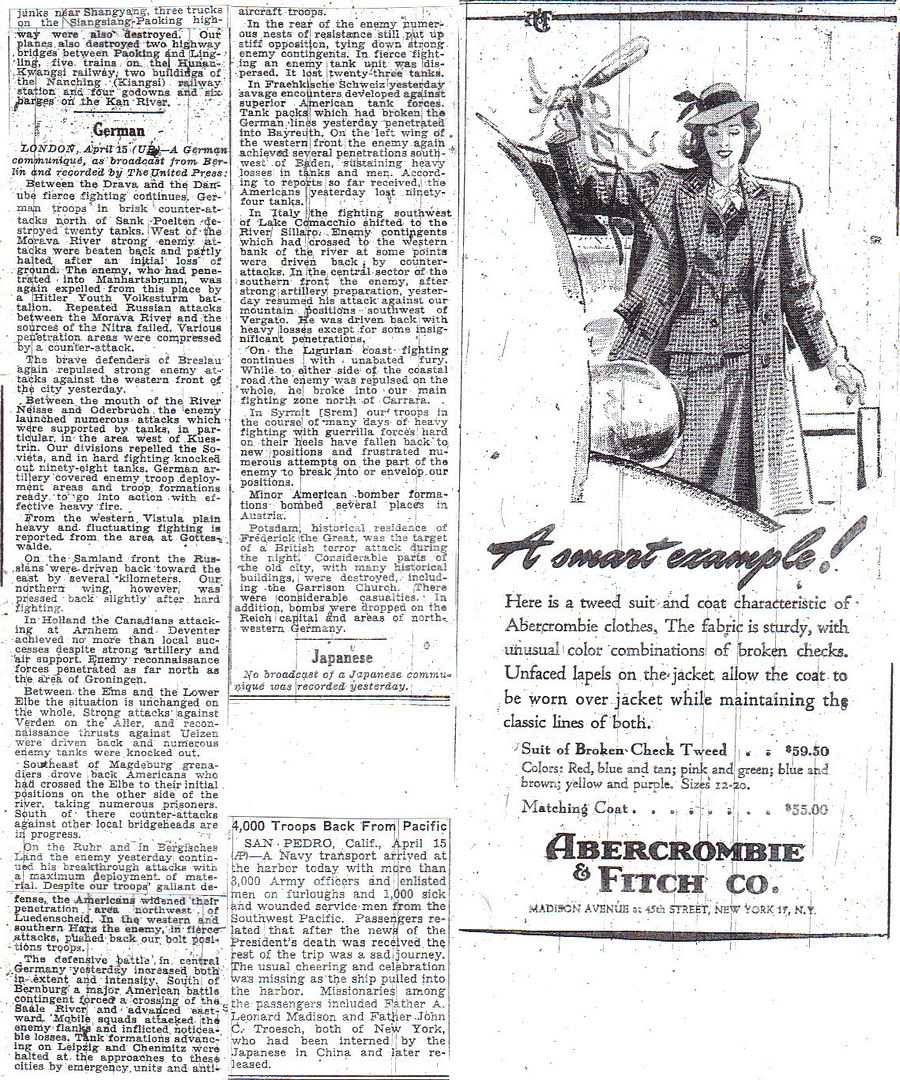
Nobody except maybe Patton wanted a hot war with the Ruskies after an exhausting two-front world war. Nevertheless, I’m not sure how strongly FDR contended for Berlin at Yalta. I mean the U.S. isn’t interested in permanent occupation but the Ruskies sure were.
It should have been a hard negotiating point IMO, with what intelligence certainly should have known about Stalin’s brutality and millions of Russian deaths at his hands. Good intelligence also should have informed us of Russia’s basic weaknesses - an empty armored shell. Knowing those things should have given us negotiating leverage.
Our disinterest and their great interest probably made a difference, but I think it was a mistake to not try harder for Berlin, if not all of it, at least the western half of Germany running through the middle of Berlin instead of the foreseeable airlifts that had to come later.
I believe Ike was an amazing Supreme Commander. The problem here wasn’t Ike - he was basically following the political will of his boss FDR, and his boss’ political agreement at Yalta. I do think FDR had or should have had the intelligence capability, foreseeability, and determination to deal effectively with Stalin. I’m not convinced he did. This was less a military issue as it was a political issue from what I can tell.
Yes. I think the nation loved him. He was dignified and respectable. Shoot, I still remember campaigning for him in the third grade in 1956 with "I LIKE IKE" buttons and signs. My parents said they were going to vote for Stevenson. I remember saying, "Not me, I'm for Ike." Don't ask me how I came up with that at that age, I have no idea. It's just what I thought.
Although I greatly admired Ike as a person and a leader, Ike had a big blind spot when it came to things like taxes which Reagan famously complained were up to 91% under Ike.

IMO, it was a foreseeable problem and a big mistake for FDR to allow Berlin to be completely surrounded by the USSR.
Roosevelt was at death’s door at Yalta, and he was surrounded by advisers who were, in my opinion, blind to who and what Stalin really was. To put it in the most charitable light I can, they naively trusted the word and goodwill of a tyrant and mass murderer.
Maybe he could have developed that if his administration hadn't been so thoroughly penetrated by Soviet spies!
I do think Ike was determined to stay out of the political side and take decisions strictly from a military point of view. And I think a lot of Americans came home from the war alive because he did that.
I think you're right. Between FDR's proclivities, his health, and his naive advisers, Stalin almost certainly knew going in he had this thing in the bag.
Well, again, Ike was probably just following orders. This to me was an FDR deal. The intelligence problem within and without in the FDR administration shows IMO that FDR was asleep at the wheel when it came to the Soviet threat.
I think the contemplation at Yalta was that of political advantage more than the risk of more or less lives being lost. IMO, the argument for what should have been the reasonably foreseeable balance of misery, suffering, and death was an argument for the Allies to take Berlin.
I had never seen that before. That was a chilling post and I have no reason to dispute it. After millions of Russian deaths, they felt very strongly they had paid in blood for the right to take Berlin.
The real horror of it all is that communist atrocities are mostly invisible. Everyone hates a Nazi, but communists get a pass.
A sympathetic treatment of the role of Harry Hopkins.
More sympathetic than I would grant personally, but still a good starting point for unraveling his important role in Roosevelt Administration events.
http://www.historynet.com/harry-hopkins-president-franklin-d-roosevelts-deputy-president.htm
GIs from Kenosha, Salt Lake City, Mobile and Boston never walked through Stalin’s camps.
http://www.conservapedia.com/Alger_Hiss
Yalta
On New Year’s Day, 1945, Secretary of State Edward R. Stettinius, Jr. told Hopkins that he had a meeting scheduled for the next day with Roosevelt, to which he was to bring “people who would be involved in the forthcoming conferences” at Yalta, in Soviet Crimea. FDR “did not want to have anyone accompany him in an advisory capacity,” but Stettinius told Hopkins he felt “Messrs. Bowman[262] and Alger Hiss ought to go.”[263]
Hiss served as aide to Stettinius, who was considered in some quarters to be “not very bright,” according to Ambassador Ellis Briggs.[264] State Department chief of security and consular affairs Samuel D. Boykin agreed that Stettinius “was not brilliant.” But, he added, the Secretary had the ability to utilize “other people’s brains”. The brain Stettinius most depended upon was that of his aide, the brilliant Alger Hiss. J. Anthony Panuch, Deputy Assistant Secretary of State in charge of security,[265] noted that “Hiss exercises Svengali-like influence over the mental processes of Junior Stettinius.”[266] Indeed, Stettinius gave Hiss control over FDR’s access to information, directing that “all memoranda for the President on topics to be discussed at the Meeting of the Big Three should be in the hands of Mr. Alger Hiss not later than Monday, January 15.”[267]
At Yalta, a withered and diminished Roosevelt flanked by Stettinius (left) and Hiss (right); Churchill (foreground right, three-quarters back view); Stalin in shadows (far left). Courtesy United Nations Department of Public Information
By this time, “Roosevelt was not always master over his mind,” according to Professor Felix Wittmer, a refugee from Nazi persecution.[268] “At Yalta he could neither think consecutively nor express himself coherently,” agreed former Soviet propagandist[269] W.H. Chamberlin. With less than three months to live, the President suffered “occasional blackouts of memory, and loss of capacity for mental concentration.”[270] His face was “gray, gaunt, and sagging and the muscles controlling the lips seemed to have lost part of their function,” wrote New Deal liberal[271] John Gunther. “I felt certain that he was going to die.”[272] According to James Farley, former Chairman of the Democratic National Committee:
“ In our evaluation of President Roosevelt, Cordell Hull and I agreed that he was a sick man at Yalta and should not have been called upon to make decisions affecting this country and the world. Physical illness, we knew, taxed his mind and left him in no shape to bargain with such hard bargainers as the Russians...[273] ”
Roosevelt’s cardiologist agreed: At the conference, Roosevelt “was obviously greatly fatigued,” he observed. “His color was very poor (gray).”[274] Dr. Roger Lee, then president of the American Medical Association, wrote during Yalta that Roosevelt “was irascible and became very irritable if he had to concentrate his mind for long. If anything was brought up that wanted thinking out he would change the subject.”[275] Chicago Tribune reporter Orville Dwyer reported that Dr. Louis E. Schmidt, a confidante of Roosevelt’s daughter Anna, informed him that at Yalta FDR suffered frequent brain seizures, during which
“ he would be unconscious (completely out) although sitting up and apparently functioning for periods of from a few seconds to several minutes. Dr Schmidt said he has no doubt from his conversations with Anna that these were occurring regularly at the time he was meeting with Churchill and Stalin and holding other momentous conferences of the utmost importance to the United States. He said the effect would be that he would be cognizant of what was going on, then suddenly lose the thread completely for anywhere from a few seconds to two or three minutes—and that he could not possibly have known what was going on in between.[276] ”
“The President seemed placid and frail,” wrote Winston Churchill. “I felt that he had a slender contact with life.”[277] “Winston is puzzled and distressed,” noted Churchill’s physician. “The President no longer seems to the P.M. to take an intelligent interest in the war; often he does not seem even to read the papers the P.M. gives him.”[278] He commented:
“ Everyone seemed to agree that the President had gone to bits physically....He intervened very little in discussions, sitting with his mouth open....I doubt, from what I have seen, whether he is fit for his job here.[279] To a doctor’s eye, the president appears a sick man. He has all the symptoms of hardening of the arteries of the brain in an advanced stage....[280] ”
In his memoirs, Churchill’s bodyguard Walter Thompson would later recall seeing the Prime Minister
“ weeping over the concessions Roosevelt made to Stalin at Yalta in 1945. “Why, Thompson, did they allow the president, almost dying on his feet, to be there?” he [Churchill] asked. “All Europe will suffer from the decisions made at Yalta.” ”
The deterioration in Roosevelt’s judgement became evident in some of his more controversial statements at Yalta, including the following, recorded in the formerly Top Secret minutes two weeks after the liberation of Aushwitz:
“ MARSHAL STALIN asked whether the President intended to make any concessions to Ibn Saud [King of Saudi Arabia].
THE PRESIDENT replied that there was only one concession he thought he might offer and that was to give him the six million Jews in the United States.
”
United Nations planning
As what Harvard historian Serhii Plokhii calls “the State Department’s expert on the United Nations” at Yalta, Hiss was involved in discussions preceeding the secret agreement[281] to give the Soviet Union three votes in the UN to one for the U.S. Although Hiss officially opposed this decision, there is some mystery as to how it came about: Hiss would later claim that the British informed him that US agreement to this Soviet demand had come from Stettinius himself, but Stettinus denied that he had ever made such an agreement.[282] Later urging Roosevelt to tell the U.S. delegation to the UN founding conference “the whole truth” about this agreement (which he called “this X-matter”), Stettinius would advise FDR to have Hiss with him when he broke the news to the American delegates.[283] The President would be dead within a month; this agreement would not be disclosed for another two years.[284]
‘Traitors’
The Soviets, already covertly informed of Roosevelt’s declining health, bugged the U.S. quarters, and listened avidly.[285] On February 4, 1945, Hiss accompanied FDR to his meeting with Churchill and Stalin. According to Robert Louis Benson, former Technical Director for Counterintelligence at the National Security Agency[286] (NSA), and Cecil Phillips, a cryptanalyst who was instrumental in cracking the Soviet code, “The Russians came to the table with ample knowledge of our purposes and attitudes, through information provided to them by traitors whose deeds ultimately were revealed in Venona.”[287] But Venona is not the only source: According to Plokhii, the foremost modern analyst of Yalta, “New evidence from the Soviet archives supports the thesis that Hiss was a Soviet spy at the time of the Yalta Conference.”[288] “One of the officials [at Yalta] we had established confidential relations with was Alger Hiss,” who was, according to Sudoplatov, “highly sympathetic to the interests of the Soviet Union.”[289] According to confidential GRU sources, during the conference, Hiss gave daily briefings to Stalin’s military adviser, General Mikhail Abramovich Milshtein, who had been one of Hiss’s control officers in 1935-38, when he served as vice-consul at the Soviet consulate New York, and was now deputy director of the GRU. Hiss’s briefings revealed not only the American negotiating strategy but insights into the attitudes of the American negotiators.[290] Sudoplatov added:
“ In conversation, Hiss disclosed to Oumansky, and then Litvinov,[291] official U.S. attitudes and plans; he was also very close to our sources who were cooperating with Soviet intelligence and to our active intelligence operators in the United States. Within this framework of exchange of confidential information were references to Hiss as the source who told us the Americans were prepared to make a deal in Europe.[292] ”
Poland
Although it had nothing to do with Hiss’s area of responsibility, the UN, when Roosevelt asked the Secretary of State “to get a lawyer to consult with him over the wording of the Polish boundary statement,” wrote Stettinius, “I called Alger Hiss.”[293] The U.S. ended up ceding eastern Poland to the Soviet Union,[294] essentially ratifying what Eden called the “Ribbentrop-Molotov” line—the deal Stalin had made with Hitler in the secret protocols of the Nazi-Soviet pact. As Pulitzer prize winning Washington Post columnist Anne Applebaum put it, Yalta “went beyond mere recognition of Soviet occupation and conferred legality and international acceptance on new borders and political structures.” It was agreed to keep these plans entirely secret. U.S. Ambassador to Poland Arthur Bliss Lane resigned in protest: “As I glanced over the document, I could not believe my eyes,” he wrote. “To me, almost every line spoke of a surrender to Stalin.”[295]
China
Hiss had input even on China. During pre-conference negotiations with British Foreign Secretary Anthony Eden, regarding the war with Japan, “Mr. Hiss brought up the question of China,” according to the formerly Top Secret minutes, “and stressed the importance which the United States attaches to U.S.-British-Soviet encouragement and support for an agreement between the Commintern [sic] and the Chinese Congress [sic].”[296] The British, due to their interests in Hong Kong and Singapore, had influence with the Kuomintang, but none with the Communists; the Soviets, who did have influence with the Communists, were not present (because they were not at war with Japan). The only effect Hiss had in bringing up the issue therefore was to co-opt the British to pressure the Chinese government into acquiescing to a Kremlin-backed power-sharing arrangement with the rebels, thus granting a measure of legitimacy to forces dedicated to its destruction—a policy that Acheson would subsequently use as a pretext to obstruct aid to China[297]—a move that would prove catastrophic for the Chinese.[298]
Among the “memoranda for the President” Stettinius directed be placed “in the hands of Mr. Alger Hiss,” according to retired U.S. intelligence analyst Christina Shelton, was a position paper registering the State Department’s strong opposition to turning over to the USSR the southern Kurile and Sakhalin islands. This State Department memo never made it into the Yalta briefing books, but did make it to Moscow, where it would be found in the Russian archives after the fall of the Soviet Union.[299]
Apparently unaware of this memo, Roosevelt ultimately made a secret agreement with Stalin (Churchill was not informed), conceding these territorial demands, as well as giving Moscow rights to the main Manchurian railroad and territory in northern China.[300] U.S. Ambassador to China Patrick J. Hurley resigned in protest,[301] alleging the existence of a “Communist conspiracy within the State Department.”[302]
Hiss would later deny under oath any role in China policy at Yalta, or in the subsequent State Department proclamation calling for “peace and unity with the Communists in China,” saying “It was not in my area of activity at all.” Hiss admitted that he “had been connected with far eastern affairs before,” but protested that after “about February 1944 [a year before he “stressed the importance” of unity with the Communists], I was assigned to United Nations work and specialized entirely in that field thereafter.”[303]
Other secret agreements
According to James F. Byrnes, then director of the Office of War Mobilization and Reconversion, he and others returned from Yalta to Washington on February 10, but Roosevelt stayed behind with a select few—including Hiss:
“ We expected the conference would end that evening and that the President would leave the following day. But that afternoon Stalin requested the President to remain one more day. He said they could not conclude their work and he wished to discuss some matter he deemed important. The President complied.... [T]he protocols... were signed on February 11.
When the President returned, he did not mention it to me and the protocol was kept locked in his safe at the White House.
”
Only after Roosevelt’s death would Byrnes, by then Secretary of State, learn—due to “a news story from Moscow,” he wrote—of “the full agreement.”[304]
Although the conference ended February 11, yet another “secret codicil” was added on March 31, less than two weeks before FDR’s death. This agreement would force the “repatriation” of some two million refugees (including 1.5 million POWs) to the Soviet Union for slave labor[305] or death in the Gulag.[306] Acting Secretary of State Joseph Grew, in Washington, sent a Top Secret telegram to Stettinius at Yalta, objecting to the repatriation as a violation of the Geneva Convention and of the traditional American policy of granting political asylum. The U.S. nevertheless agreed to the repatriation (which would become known as Operation Keelhaul), but that agreement was kept secret from the American people for 50 years. As Chamberlin concluded:
“ The Yalta Agreement … represented, in two of its features, the endorsement by the United States of the principle of human slavery. One of these features was the recognition that German labor could be used as a source of reparations … And the agreement that Soviet citizens who were found in the Eastern zones of occupation should be handed over to Soviet authorities amounted, for the many Soviet refugees who did not wish to return, to the enactment of a fugitive slave law.[307] ”
Asked if he had “drafted or participated in the drafting” of parts of the Yalta agreement, Hiss would testify, “I think it is accurate and not an immodest statement to say that I did to some extent, yes.”[308]
‘ALES’
After the conference, Hiss went on to Moscow,[309] where he was honored by Foreign Minister V.M. Molotov. According to Cambridge professor Christopher Andrew, the dean of British historians of Soviet espionage, Soviet “files show that after the Yalta conference Hiss was secretly awarded the order of the Red Star during a visit to Moscow.”[310] In 2006, the official newspaper of the Russian Ministry of Defense, Krasnaya Zvezda (Red Star), confirmed that five members of a Soviet military intelligence apparatus in Washington (one of whom had been a GRU source in the 1930s, and had access to high-level intelligence about U.S. foreign policy) received Soviet decorations in February 1945.
On April 25, 1945, Pavel Fitin, head of NKVD foreign intelligence, reported to NKVD Chief Vsevolod Merkulov that Harold Glasser, a Soviet agent in the U.S. Treasury code-named “Ruble,”[311] learned of this award from his friend, “Ales,” a GRU agent:
Vishinskii (2nd from left), Molotov (5th from left), Stettinius (7th from left), Alger Hiss (right), ca. January 1945. Image courtesy Franklin D. Roosevelt Library, National Archives and Records Administration
“ According to data from Vadim the group of agents of the “military” neighbors whose part Ruble was earlier, recently was decorated with orders of the USSR. Ruble learned about this fact from his friend Ales, who is the head of the mentioned group.[312] ”
This memo apparently refers to Venona decrypt 1822, dated March 30, 1945, in which “Vadim” (Anatoly Gorsky) reports,[313] following up on a conversation with “Ales,” that “Ales has been working with the neighbors [GRU][314] continuously since 1935”; that for “a few years now he has been the director of a small group of probationers [agents][315] of the neighbors for the most part drawn from his relatives”;[316] that recently, “Ales and his whole group were awarded Soviet medals”; and that after “the Yalta conference, back in Moscow, one very high-ranking Soviet worker allegedly had contact with Ales (Ales implied that it was Comrade Vyshinskii) and at the request of the military neighbors he conveyed to him their thanks, etc.” Regarding “Ales,” one FBI memo reports:
“ It would appear likely that this individual is Alger Hiss in view of the fact that he was in the State Department and the information from Chambers indicated that his wife, Priscilla, was active in Soviet espionage and he also had a brother, Donald, in the State Department. It also is to be noted that Hiss did attend the Yalta conference as a special adviser to President Roosevelt, and he would, of course, have conferred with high officials of other nations attending the conference.[317] ”
In its unanimous final report in 1997, the bipartisan Moynihan Commission on Government Secrecy agreed regarding Ales, “This could only be Alger Hiss.”[318] Analysts at the NSA have also gone on record that Ales could only have been Alger Hiss. The late U.S. Air Force historian Eduard Mark called the FBI and NSA’s conclusions “eminently reasonable,” writing that the evidence showed that “ALES was very probably Hiss.”[319] John R. Schindler, professor of strategy at the Naval War College and himself a former NSA analyst, agrees, calling this identification “exceptionally solid” and the evidence “compelling.” John Ehrman of the CIA’s Directorate of Intelligence concurs, “it is clear that Hiss alone remains the best candidate to be ALES.” Christopher Andrew, writing with ex-KGB agent Vasili Mitrokhin, says the identification of “Ales” as Hiss is “beyond reasonable doubt.”[320] The codename Ales, concludes Mark Kramer, director of the Project for Cold War Studies at Harvard University, “seems to fit only Hiss.”
The name “Alger Hiss” in English, from Vassiliev’s notes on Perlo’s March 15, 1945 list to Moscow Center. Image courtesy Cold War International History Project, Woodrow Wilson International Center for Scholars
On March 15, Victor Perlo (code-named “Raid”) gave Moscow (in English) a list of people not in his “Perlo group” whom he knew worked with Soviet intelligence. Included on that list was the name “Alger Hiss.”[321] Five days later, State Department security officer Raymond Murphy interviewed Chambers. Murphy’s notes record that Chambers reiterated his identification of Hiss as a member of the Communist Party underground apparatus, but added that he was also the leader of a cell and not merely a Communist but, said Chambers, an agent of influence who sought to shape U.S. policy “in keeping with the desires of the Communist Party,” as well as an espionage agent who “disclosed much confidential matter.”[322]
On March 24, FBI agent E.A. Tamm, assistant to FBI Director J. Edgar Hoover, alerted Robert Lynch, Special Assistant to the Secretary of State, to Chambers’ allegations that Hiss had been a member of the underground organization of the Communist Party, and to Hiss’s links to Nathan Witt and Lee Pressman. After interviewing Hiss the next day,[323] FBI official D.M. Ladd furnished Frederick B. Lyon, Chief of the State Department Division of Foreign Activity Correlation, a summary memorandum outlining this information.[324] On March 26, State Department security officer Robert Bannerman sent Donald Russell, Assistant Secretary of State for Administration, a comprehensive secret report on Chambers’ allegations regarding Hiss, recommending “that immediate action be taken to terminate Mr. Hiss’s services with the Department.”[325]
United Nations
Even as the Soviets were decorating “Ales”, Hiss was promoted to become Director of the State Department Office of Special Political Affairs. Shortly thereafter, he was named Secretary-General[326] of the upcoming United Nations Charter Conference in San Francisco. “As Secretary-General, managing the agenda,” reported Time, Hiss “will have a lot to say behind the scenes about who gets the breaks.”
On March 19, “Wild Bill” Donovan, director of the Office of Strategic Services (precursor of the CIA), offered Stettinius the services of OSS foreign experts to prepare research studies “on all personnel concerned” in the conference. According to Stettinius, Hiss “strongly opposed” this proposal, and “vigorously endorsed” the view that OSS “doing espionage work” at the conference would “seriously embarrass us.” As a result, “American intelligence work at the conference was sharply limited.”[327]
Meanwhile, “Vadim” (Gorsky)[328] wanted to meet with “Ales” at the conference, according to a cable Vassiliev discovered in the Soviet archives. His notes indicate that “Ales” had worked with “Ruble” (Harold Glasser) as a member of a group run by “Karl” (Whittaker Chambers).[329] The cable adds that “’Ruble’ gives ‘Ales’ an exceptionally good political reference as a member of the Comparty.... completely aware that he is Communist in an illegal position, with all the ensuing consequences,” and recommends (according to the notes) that he be approached at the UN conference by “Sergei” (NKVD agent Vladimir Pravdin,[330] then under cover as New York bureau chief of the Soviet news agency TASS)[331] or Gorsky, “alluding either to the password, or to ‘Ruble’, or simply to ‘Ales’s’ progressive attitudes.”
In April 1945, at the UN conference, Glasser slipped Gorsky a warning that the FBI had notified Stettinius that Bureau surveillance had followed a bundle of State Department documents from Washington to New York, where they were photographed, then returned within 24 hours to Washington. Only three people had access to these documents, one of whom was “Ales.” Stettinius told “Ales”: “I hope it is not you.”[332]
After the conference, Stettinius resigned to become the first U.S. Ambassador to the United Nations. His successor as Secretary of State, James Byrnes, was immediately “faced with the problem of what he would do with Alger.”[333] Byrnes had been “pushed out” of planning the UN conference, according to Stettinius, after FDR had signaled “that Alger Hiss and I should handle this entirely ourselves.”[334]
Byrnes said that despite his categorical instructions not to recommend any U.S. citizen for posts in the UN Secretariat, “Hiss forwarded to the UN the resumes of nearly 500 people, many of them his confreres at State, as prospective global staffers.”[335] Many were members of Communist cells in the government, whose jobs were at risk under a tightened security program. The Communist Dalton Trumbo, a thoroughgoing Stalinist, boasted that he had been Stettinius’ ghost-writer at the conference.[336] Press accounts attributed the hiring of Trumbo (who would become infamous in 1947 as one of the “Hollywood Ten”) to Hiss.[337]
Hoping to obtain “control of the entire Mediterranean,” the Soviets forced through a UN resolution demanding “an immediate boycott” of Spain. But as it gradually became clear that the Soviets were seeking “Communist expansion world-wide,” the US sought the reversal of this UN resolution. According to William B. Dunham of the State Department’s Office of Western European Affairs:[338]
“ [I]n the State Department... many, especially in the Bureau of UN Affairs.... took every opportunity, tried every dodge, to oppose or at least obstruct as best they could... reversing the UN resolution.... Deputy Assistant Secretary for UN Affairs, Alger Hiss... led the obstructionists there.[339] ”
According to a State Department internal security probe of Hiss ordered by Byrnes (and made public in 1993),[340] in February 1945, Hiss requested top-secret files from the OSS on British, Soviet, French and Chinese internal security policies, as well as Far East policy.[341] FBI surveillance at this time found that Hiss also developed “a keen interest in atomic energy” and other matters relating to military intelligence[342]—all of which were well outside the purview of his office.[343] This finding was congruent with a Venona cable dated the following month, in which Gorsky reported that “Ales” and his group were “working on obtaining only military information,” since Soviet military intelligence “allegedly are not very interested” in “materials about the Bank [United States Department of State].”[344] Loy Henderson, director of the State Department Office of Near East Affairs (NEA), quietly ordered members of NEA to keep confidential materials and information from Hiss.[345]
On June 26, The UN Charter was signed in San Francisco. Two days later, State Department liaison Lt. Andrew Roth of the Office of Naval Intelligence was arrested in the Amerasia spy case. Communist Party General Secretary Eugene Dennis told CPUSA National Committee member Jack Stachel[346] that Roth suggested that Alger Hiss might be used to quash the case, according to former CPUSA Politburo member Louis Budenz.[347]
On September 5, 1945, GRU code clerk Igor Gouzenko defected from the Soviet Embassy in Ottawa, telling the Royal Canadian Mounted Police that one Lt. Kulakov in the office of the Soviet military attaché told him that he had learned in Moscow prior to his departure in May 1945 that an assistant to then U.S. Secretary of State Stettinius was a Soviet spy.[348] Stettinius’ aide at the time was Alger Hiss.[349]
Two days later, Canadian Prime Minister William Lyon Mackenzie King wrote that acting under-secretary of state for external affairs Norman Robertson told him that Gouzenko’s documents disclosed that “everything was much worse than we would have believed…. Stettinius [had] been surrounded by spies, etc., and the Russian Government [had] been kept informed of all that was being done from that source...”[350]
That same day, Soviet UN Ambassador Andrei Gromyko, in London, told Stettinius, now the new U.S. Ambassador to the UN, that he “would be very happy to see Alger Hiss appointed temporary secretary general”—and thus a candidate for the first permanent Secretary General—of the United Nations.[351] Gromyko was reiterating a suggestion he had made at the San Francisco conference the previous April.[352]
Also that day, Hiss made an extraordinary proposal that the State Department create a new post, that of “special assistant for military affairs,” linked to his Office of Special Political Affairs,[353] thus giving Hiss access to information regarding atomic energy, arms procurement and military intelligence.[354] Hiss also proposed a State Department reorganization scheme, under which, wrote Panuch, Hiss would acquire “working control” over the flow of papers within the department. “If this ambitious project should be approved,” warned Panuch, “the Hiss group will have achieved infiltration in, or control of” what he identified as “critically strategic points” within State.[355]
On September 29, the Canadian Prime Minister met with Truman and Acheson in the White House, telling them that, according to Gouzenko, “an assistant secretary of the Secretary of State’s department was supposed to be implicated” in GRU espionage. According to King, Truman “turned to Acheson and said something to the effect that it would not be surprising.”[356] Following up on Gouzenko’s revelations, Raymond Murphy of the State Department again interviewed Chambers, who stated that Hiss’s assignment was “to mess up policy.”[357] On September 25, Walter Winchell again broached the subject on his broadcast, reporting, “It can be categorically stated that the question of the loyalty and integrity of one high American official has been called to the attention of the President.”[358]
Elizabeth Bentley
In November 1945, Father Charles F. Cronin, a priest instructed by the United States Conference of Catholic Bishops to prepare a study of the spread of Communism in the United States,[359] reported, “In the State Department, the most influential Communist has been Alger Hiss.”[360] On November 27, the FBI disseminated a secret report to the State Department, the Attorney General, and the Truman White House, reporting Chambers’ identification of Hiss as a secret member of the Communist underground apparatus in contact with the Ware group.[361] Three days later, defecting Soviet courier Elizabeth Bentley advised FBI investigators that Victor Perlo told her that Harold Glasser had been taken away from the “Perlo group” and turned over to a Russian “by some American in some governmental agency in Washington.”[362]
Alger Hiss and Harold Glasser were awarded the Order of the Red Star for their loyalty to the Soviet Union.
http://www.wnd.com/2012/04/finally-the-truth-about-soviet-spy-alger-hiss/
Finally, the truth about Soviet spy Alger Hiss
Find out why the cover-up of U.N. architect’s betrayal continues
Very interesting and Marshall’s hand in it is just another condemnation of that man.
I like Ike. As a boy he worked in one of my great-grandfather's creamery, in Abiline, Kansas, his family history is similar to mine -- Pennsylvania "Dutch".
Eisenhower home in Abiline, Kansas: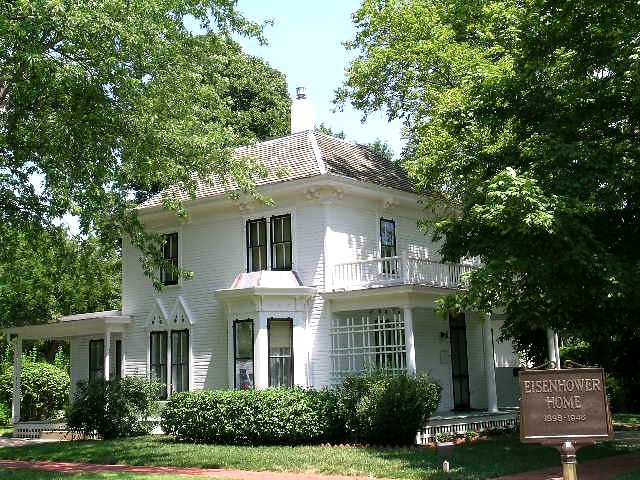
Roosevelt overlooked Stalin's atrocities in order to secure the WWII alliance, probable that nobody knew then the full extent of mass deaths under Stalin.
Victims of Soviet NKVD in Lviv, June 1941:
Plaque on the building of Government of Estonia, Toompea, commemorating government members killed by communist terror: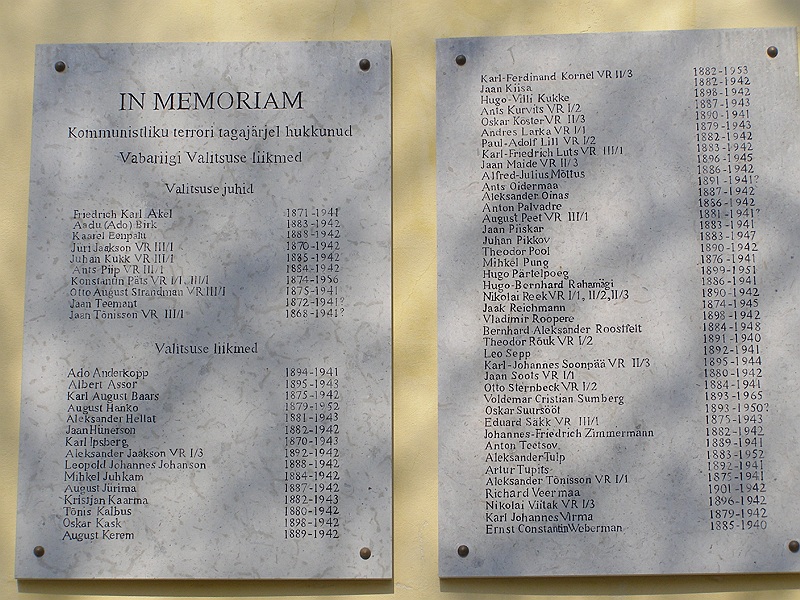
Disclaimer: Opinions posted on Free Republic are those of the individual posters and do not necessarily represent the opinion of Free Republic or its management. All materials posted herein are protected by copyright law and the exemption for fair use of copyrighted works.